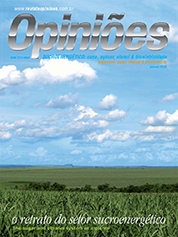Pedro Isamu Mizutani
President of Cosan Açúcar e Álcool
Op-AA-25
Solutions for a contemporary world
Consolidated as one of the biggest players in the sugar and ethanol industry, Brazil has increasingly attracted international attention, whereas this has not happened only because of its excellent production indices, fertile land and privileged climate. Products obtained from sugarcane have become a part of the solution in a new scenario of sustainable development, given that the crop is capable of producing energy for people in the form of food, for cars in the form of ethanol and for homes in the form of electric energy obtained from co-generation.
The efficiency of sugarcane as an energy solution was recently acknowledged by one of the most respected environmental entities in the world. After two years of research, the Environmental Protection Agency of the United States (EPA) classified ethanol from sugarcane as “advanced biofuel”, with a proven reduction of 61% in greenhouse gases in comparison with gasoline.
This figure is three times higher than the corresponding figure for ethanol obtained from corn, in which the reduction was only 21% in relation to fossil fuel. Furthermore, it is important to point out that in Brazil we master the most updated research techniques for use with ethanol in a variety of applications. Proof hereof is the recently signed agreement between Cosan and Braskem to supply hydrated ethanol for the production of so-called “green plastic”.
In this case, Cosan’s input replaces ingredients extracted from oil, which are widely used in plastics. Over a five-year period, 175 million liters of this type of ethanol will be supplied annually to Braskem, and even the transport will take place in a less polluting manner, utilizing the railroad system. By means of a partnership with ALL, the transport will take place to Braskem’s plant in Triunfo (State of Rio Grande do Sul - RS), by rail, thereby removing approxi-mately 4,000 trucks from the roads each year.
This initiative will contribute to an approximately 90% reduction in CO2 emissions to the atmosphere, in the comparison of transport by rail versus by road. Brazil has also become the world’s largest sugar exporter, in an adverse international scenario, with worldwide inventory levels far below historical levels, which will need to be replenished, in addition to the still felt effects of a poor harvest in India.
In this context, Brazilian sugar became the solution for several markets, which reflected in the Cosan Group’s annual balance sheet. In fiscal year 2009/2010, more than 3 million tons of the commodity were sold abroad, to a variety of destinations, including India itself, Arab countries and the European Union. This data shows that the industry was able to quickly meet the needs of the consumer market, increasingly demanding of solutions, while not neglecting the world’s need for food.
On top of all that, sugarcane bagasse is transformed into clean energy and is the factor behind the diversification of Brazilian energy matrixes, especially in times of drought, when reservoirs reach their lowest levels. In the 2009/2010 harvest season, revenues from the sale of energy totaled R$ 92.4 million, with a volume of 569,000 MWh. It is important to point out that even considering the volume destined for sale, all of the group’s 23 mills are self-sufficient in energy consumption.
Currently, 11 units sell their surplus in auctions or through bilateral contracts, based on an installed energy capacity of 2,500 GWh per year. With so many possibilities of doing business and a promising development, it is natural that the industry continues attracting the attention of large investors and international players, including those interested in entering this market.
However, we believe this trend will strengthen the Brazilian sugar and ethanol industry, allowing the creation of multinational companies with Brazilian characteristics, as is the case of different companies in other areas of agro industry. Brazil will continue to master the production techniques that revolutionized this industry, along with good management practices to retain talent, which made the country a legitimate global representative of the industry. Therefore, we believe the arrival of new entrants will further strengthen this area, optimizing solutions already currently being offered, and with the possibility of expanding the supply of such services (clean fuel, quality food and renewable energy) to all consumer markets in search of renewable and clean solutions.




